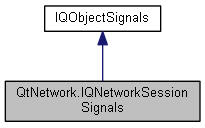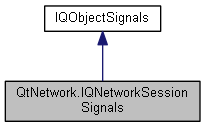|
Qyoto
4.0.5
Qyoto is a C# language binding for Qt
|
|
Qyoto
4.0.5
Qyoto is a C# language binding for Qt
|


Public Member Functions | |
| void | StateChanged (QNetworkSession.State arg1) |
| | |
| void | Opened () |
| | |
| void | Closed () |
| | |
| void | Error (QNetworkSession.SessionError arg1) |
| | |
| void | PreferredConfigurationChanged (QNetworkConfiguration config, bool isSeamless) |
| | |
| void | NewConfigurationActivated () |
| | |
 Public Member Functions inherited from QtCore.IQObjectSignals Public Member Functions inherited from QtCore.IQObjectSignals | |
| void | Destroyed (QObject arg1) |
| void | Destroyed () |
| | |
| void QtNetwork.IQNetworkSessionSignals.Closed | ( | ) |
This signal is emitted when the network session has been closed.
| void QtNetwork.IQNetworkSessionSignals.Error | ( | QNetworkSession.SessionError | arg1 | ) |
Returns the type of error that last occurred.
See also state() and errorString().
| void QtNetwork.IQNetworkSessionSignals.NewConfigurationActivated | ( | ) |
This signal is emitted once the session has roamed to the new access point. The application may reopen its socket and test the suitability of the new network link. Subsequently it must either accept() or reject() the new access point.
See also accept() and reject().
| void QtNetwork.IQNetworkSessionSignals.Opened | ( | ) |
This signal is emitted when the network session has been opened.
The underlying network interface will not be shut down as long as the session remains open. Note that this feature is dependent on system wide session support.
| void QtNetwork.IQNetworkSessionSignals.PreferredConfigurationChanged | ( | QNetworkConfiguration | config, |
| bool | isSeamless | ||
| ) |
This signal is emitted when the preferred configuration/access point for the session changes. Only sessions which are based on service network configurations may emit this signal. config can be used to determine access point specific details such as proxy settings and isSeamless indicates whether roaming will break the sessions IP address.
As a consequence to this signal the application must either start the roaming process by calling migrate() or choose to ignore() the new access point.
If the roaming process is non-seamless the IP address will change which means that a socket becomes invalid. However seamless mobility can ensure that the local IP address does not change. This is achieved by using a virtual IP address which is bound to the actual link address. During the roaming process the virtual address is attached to the new link address.
Some platforms may support the concept of Forced Roaming and Application Level Roaming (ALR). Forced roaming implies that the platform may simply roam to a new configuration without consulting applications. It is up to the application to detect the link layer loss and reestablish its sockets. In contrast ALR provides the opportunity to prevent the system from roaming. If this session is based on a configuration that supports roaming the application can choose whether it wants to be consulted (ALR use case) by connecting to this signal. For as long as this signal connection remains the session remains registered as a roaming stakeholder; otherwise roaming will be enforced by the platform.
See also migrate(), ignore(), and QNetworkConfiguration::isRoamingAvailable().
| void QtNetwork.IQNetworkSessionSignals.StateChanged | ( | QNetworkSession.State | arg1 | ) |
This signal is emitted whenever the state of the network session changes. The state parameter is the new state.
See also state().